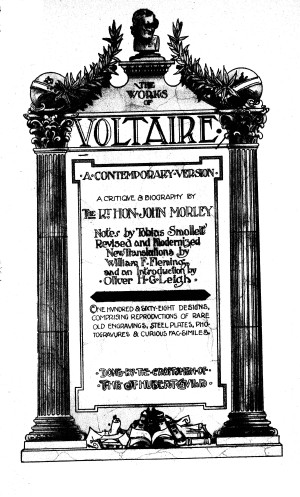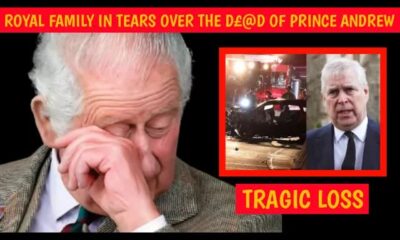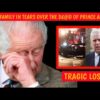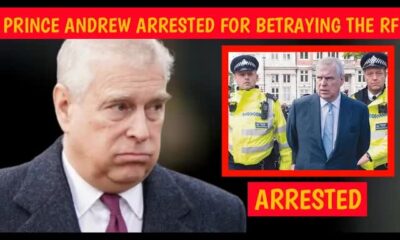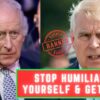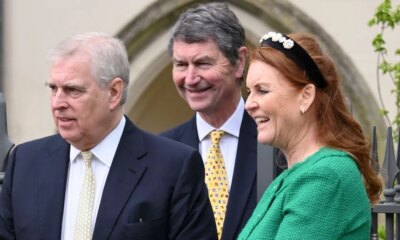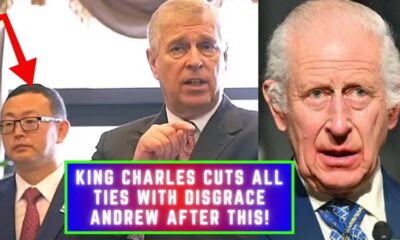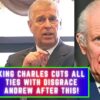Must Read
Prince Andrew’s Plea for Redemption: A Royal Farce or a Genuine Call for Change?
In a dramatic turn of events, Prince Andrew's recent attempts to seek redemption have been met with skepticism and ridicule.
As he navigates the fallout from his past misdeeds, many are left wondering if his cries for a second chance are sincere or simply a desperate grasp at maintaining his royal status.
With King Charles III poised to officially oust him from Buckingham Palace, the stark contrast between Andrew's past privileges and his current predicament is glaringly evident.
Once a prominent figure in royal circles, Andrew now finds himself on the periphery, desperately clinging to memories of his former glory.
His eviction from the palace, while largely symbolic, carries significant weight.
It reflects a royal family eager to distance itself from the shadows of Andrew's controversial history, which has undeniably tainted the monarchy's reputation.
The desire to cleanse the royal image is palpable, yet Andrew's insistence on remaining relevant feels not only inappropriate but also profoundly out of touch.
His so-called plea for a second chance appears more like a self-serving maneuver than a genuine request for forgiveness.
Critics argue that this behavior reveals an alarming lack of self-awareness.
Rather than acknowledging the severity of his actions, Andrew seems intent on portraying himself as the victim of familial ostracism.
This sense of entitlement is not only frustrating but also indicative of a man who has failed to grasp the magnitude of his past.
Andrew's insistence on playing the victim card is particularly galling.
Instead of taking accountability, he prefers to paint himself as a misunderstood royal seeking sympathy.
However, forgiveness is not something that can be bartered; it must be earned through authentic remorse and significant change—qualities that Andrew has yet to exhibit.
His continued presence serves as a reminder of the royal family's past missteps, complicating their efforts to present a united front to the public.
The connection between Andrew and high-profile scandals, particularly those involving Jeffrey Epstein, has left an indelible mark on the royal brand.
The notion that he could simply reintegrate into royal life without addressing these issues is absurd.
The public remains acutely aware of his tarnished reputation, and the scrutiny surrounding him is unlikely to wane anytime soon.
Moreover, Andrew's desire to resume royal duties after such a tumultuous history feels utterly disconnected from reality.
How can he reconcile his wish for royal status with a track record marred by scandal?
His longing for normalcy is not just out of touch; it's an affront to those who have suffered due to his actions.
The royal family's decision to distance itself from him is a necessary step toward rebuilding its image.
As King Charles III seeks to reshape the monarchy, Andrew's call for redemption will likely fall on deaf ears—not only within the palace but among the general public as well.
His pleas echo the sentiments of a man who has lost the respect of those around him, leaving him with little more than misguided ambitions and a reputation that has crumbled beyond repair.
For Andrew to truly seek redemption, he must first confront the consequences of his past actions.
The royal family, and indeed the public, may not be ready to welcome him back with open arms.
Sources close to the monarchy suggest that King Charles is determined to forge a new path, one that is untainted by previous controversies.
The decision to evict Andrew from a space traditionally reserved for family gatherings signals a pivotal shift in royal dynamics.
This move is essential, especially given Andrew's relentless clinging to royal privileges despite his disgraceful history.
In a time when transparency and accountability are paramount, his presence within the royal household is not just embarrassing; it contradicts the very image that King Charles aims to project.
By removing Andrew from a space symbolizing unity, the king sends a clear message: the monarchy will no longer tolerate behavior that undermines its integrity.
As the monarchy grapples with its identity, Andrew's past serves as a cautionary tale rather than a model for future behavior.
His repeated attempts to downplay his connections to notorious figures further demonstrate his delusion.
The stain of scandal is not easily erased, and the public remains skeptical of his efforts to reinsert himself into royal life.
While other family members engage with the public and fulfill their duties with grace, Andrew appears preoccupied with his own narrative, desperately trying to maintain relevance.
His antics border on pathetic, as he becomes a caricature of a prince clinging to a title that loses significance with each passing day.
The royal family is slowly learning to adapt, embracing change while standing united against the burdens of the past.
In this era of accountability, the question remains: will Andrew ever recognize that genuine change requires more than mere words?
His pleas for acceptance are met with silence from both the public and the royal family.
King Charles' decisive actions reflect a commitment to moving forward, leaving behind the toxic influence of a disgraced prince.
Only time will tell whether Andrew can come to terms with his place in this new world, one that no longer requires his presence or empty proclamations.
